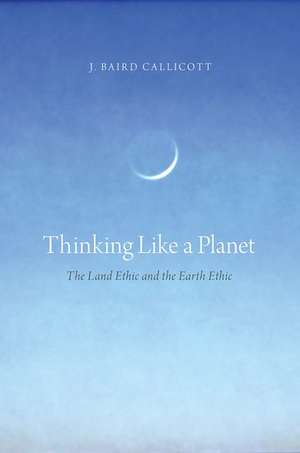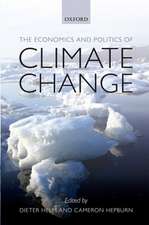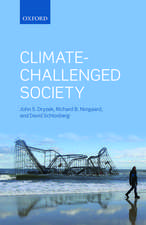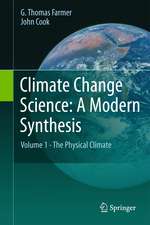Thinking Like a Planet: The Land Ethic and the Earth Ethic
Autor J. Baird Callicotten Limba Engleză Paperback – 20 feb 2014
| Toate formatele și edițiile | Preț | Express |
|---|---|---|
| Paperback (1) | 371.29 lei 32-37 zile | |
| Oxford University Press – 20 feb 2014 | 371.29 lei 32-37 zile | |
| Hardback (1) | 821.87 lei 32-37 zile | |
| Oxford University Press – 20 feb 2014 | 821.87 lei 32-37 zile |
Preț: 371.29 lei
Preț vechi: 425.26 lei
-13% Nou
Puncte Express: 557
Preț estimativ în valută:
71.05€ • 75.97$ • 59.24£
71.05€ • 75.97$ • 59.24£
Carte tipărită la comandă
Livrare economică 07-12 aprilie
Preluare comenzi: 021 569.72.76
Specificații
ISBN-13: 9780199324897
ISBN-10: 0199324891
Pagini: 400
Ilustrații: black & white illustrations
Dimensiuni: 155 x 231 x 31 mm
Greutate: 0.52 kg
Editura: Oxford University Press
Colecția OUP USA
Locul publicării:New York, United States
ISBN-10: 0199324891
Pagini: 400
Ilustrații: black & white illustrations
Dimensiuni: 155 x 231 x 31 mm
Greutate: 0.52 kg
Editura: Oxford University Press
Colecția OUP USA
Locul publicării:New York, United States
Recenzii
Baird Callicott's magisterial book brings together science and philosophy in a fascinating search for an ethic that truly responds to the global-scale reality of today's most pressing environmental concerns. Highly recommended.
Aldo Leopold's Land Ethic was one of the great philosophical (and practical) developments of the 20th century, and Now J. Baird Callicott manages to extend its scale dramatically. Trenchant and fascinating.
An innovative, pioneering, and powerful synthesis of Aldo Leopold's ethics. Callicott broadens Leopold's well-known land ethic by identifying within his writings a comprehensive Earth ethic that is global in scope. Together the two ethics entail sentient community insights and planetary visions. Anyone who seeks a moral grounding for current conservation, resource, and environmental actions will want to read this book.
Over the last four decades no one has done more to construct the intellectual framework of modern environmental ethics than J. Baird Callicott. Now, in this sweeping synthesis, Callicott draws upon an extraordinary breadth of insights from Western and non-Western philosophy, political theory, ecocriticism, religious studies, environmental history, the history of science, evolutionary biology, ecology, and earth science to provide the fullest development of his ideas. If we are to find our way forward in the 'Age of Consequences,' humanity will need to think anew about our history and our values, our prospects and our place in time. Callicott is an indispensable and challenging guide as we continue in this necessary task.
abundantly stimulating and vital contribution to Leopold scholarship, climate ethics and environmental philosophy...
Aldo Leopold's Land Ethic was one of the great philosophical (and practical) developments of the 20th century, and Now J. Baird Callicott manages to extend its scale dramatically. Trenchant and fascinating.
An innovative, pioneering, and powerful synthesis of Aldo Leopold's ethics. Callicott broadens Leopold's well-known land ethic by identifying within his writings a comprehensive Earth ethic that is global in scope. Together the two ethics entail sentient community insights and planetary visions. Anyone who seeks a moral grounding for current conservation, resource, and environmental actions will want to read this book.
Over the last four decades no one has done more to construct the intellectual framework of modern environmental ethics than J. Baird Callicott. Now, in this sweeping synthesis, Callicott draws upon an extraordinary breadth of insights from Western and non-Western philosophy, political theory, ecocriticism, religious studies, environmental history, the history of science, evolutionary biology, ecology, and earth science to provide the fullest development of his ideas. If we are to find our way forward in the 'Age of Consequences,' humanity will need to think anew about our history and our values, our prospects and our place in time. Callicott is an indispensable and challenging guide as we continue in this necessary task.
abundantly stimulating and vital contribution to Leopold scholarship, climate ethics and environmental philosophy...
Notă biografică
J. Baird Callicott is University Distinguished Research Professor at the University of North Texas. He is co-Editor-in-Chief of the Encyclopedia of Environmental Ethics and Philosophy and author or editor of a score of books and author of dozens of journal articles, encyclopedia articles, and book chapters. His research goes forward on three main fronts: theoretical environmental ethics, comparative environmental philosophy, philosophy of ecology and conservation biology. He taught the world's first course in environmental ethics in 1971 at the University of Wisconsin-Stevens Point.











